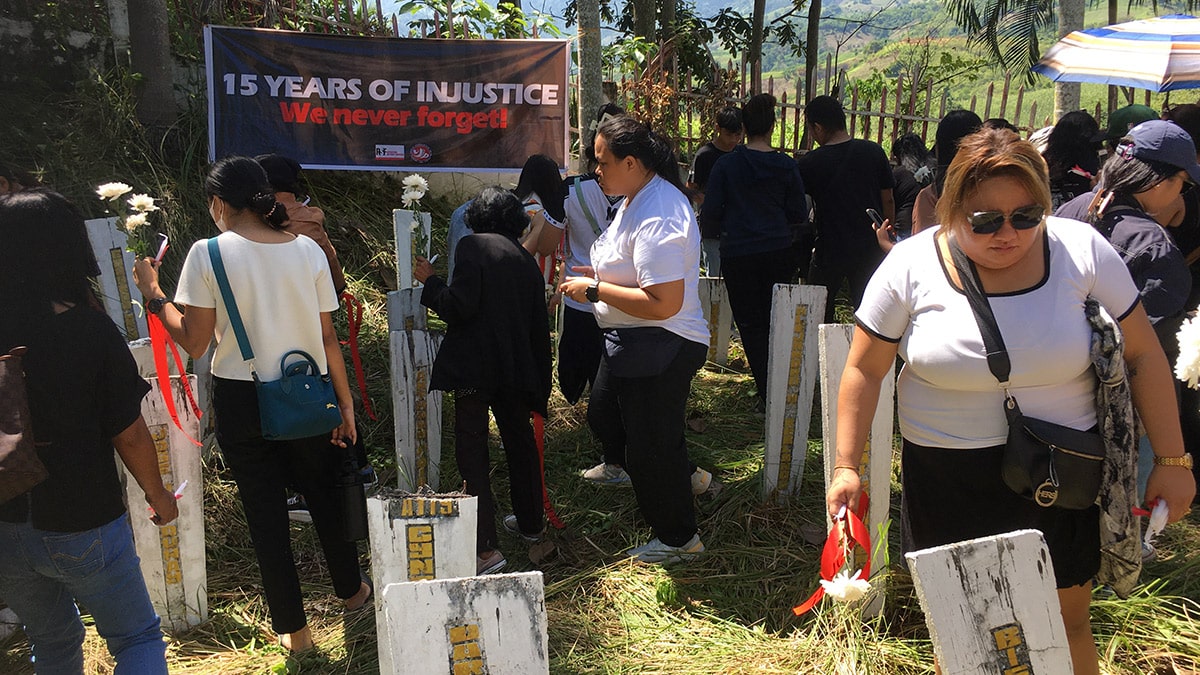Ampatuan massacre victims’ kin still crying out for help

ECLIPSED BY TIME Families of media workers killed in the massacre in Ampatuan town, Maguindanao del Sur, on Nov. 23, 2009, visit the site of the mass murder at Sitio Masalay, Barangay Salman in Ampatuan on Sunday, lamenting they are now forgotten or even ignored by personalities, including their lawyers, who used to help them. —Germelina Lacorte
GENERAL SANTOS CITY, SOCCSKSARGEN, Philippines — Almost 15 years after the massacre in Ampatuan, Maguindanao del Sur, that killed 58 people, families of the slain journalists lamented that they were being ignored by people who once came to help them.
Rolly Morales, brother of the slain media worker Rosell Morales, expressed this sentiment shared by other families during the advanced visit with journalists to the site on Sunday, ahead of the Nov. 23 commemoration of the 2009 massacre that placed the country among the world’s most dangerous place for journalists.
READ: Maguindanao massacre: The wound of PH impunity that will never heal
“Napag-iwanan na kami ng mga taong sa umpisa ay sumusuporta sa amin (We haven’t heard from people who once supported us),” Morales said.
He particularly called out former Maguindanao Gov. Esmael “Toto” Mangudadatu, whose wife and relatives were among those who died in the grisly crime perpetrated by members of the Ampatuan clan who are also relatives of the Mangudadatus.
Article continues after this advertisementOther families were also asking where was former presidential spokesperson Harry Roque, who, then a private practicing lawyer, handled some cases of the victims.
Article continues after this advertisementThey said she also have not heard from their other lawyers as they sought update on the case now pending appeal by those convicted for the crime, mainly former Datu Unsay town Mayor Andal “Unsay” Ampatuan and his older brother, former Autonomous Region in Muslim Mindanao Gov. Zaldy Ampatuan.
Only just
The families of slain media workers also called on the government to release the compensation for the victims as part of the justice they asked for.
“We are calling on the government to please give us the compensation. We already feel [left] out; we don’t know what is the update of the case,” added Morales.
Emily Lopez, president of Justice Now, a group composed of families of slain media workers, said the issue of compensation is not just about money but it’s the first step of delivering justice to the victims.
“They took away lives,” she said. “Without compensation received by the family, there’s no justice, kasi buhay ang kinuha (because they took lives).”
Ian Jay Roy Perante, 27, said he was still 12 years old when his father, Ronnie Perante, died in the massacre.
As the eldest son, he took over most of his father’s responsibility by helping his mother earn income for the family.
Although he finished his criminology course under the scholarship of the National Union of Journalists of the Philippines (NUJP), he did not pursue his dream of becoming a police officer because entering the Philippine National Police Academy meant that he would have to study full time, setting aside the needs of his family.
He said he had to work to send his siblings to school, after the NUJP scholarship funds ran out.
Perante said the compensation for the victims would be the first step of addressing the demand for justice for those killed in the massacre because of the extent that their lives were disrupted and turned upside down.
“It’s not easy to lose a father,” he said.
Zorayda Eva Lim Mustaril, NUJP director, said 15 years seemed a long time but for those who lost their loved ones, the wounds left by that tragic day remained fresh.
“Ito ang araw na hindi lamang kinitil ang buhay ng 58 katao, kabilang ang 32 mamamahayag, kundi pati ang pananampalataya sa ating kakayahang pairalin ang hustisya at demokrasya (This is the day when they did not only take the lives of 58 people, including 32 journalists, but also our belief that justice and democracy can still prevail),” she said as she urged them to continue the fight.